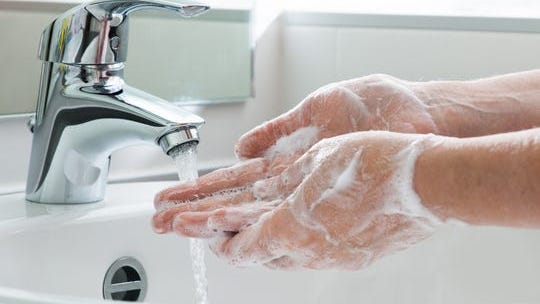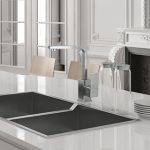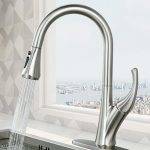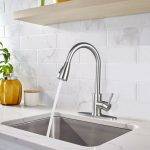Sensible loos have been round because the Nineteen Eighties. However do they assist in opposition to coronavirus?

By itself, the bathroom flushes.
By itself, the tap begins.
By itself, the hand-dryer blows, the soap-holder squirts, and the towel dispenser dispenses.
Automated public restrooms, an more and more frequent function in America since their introduction within the Nineteen Eighties, can appear to be magic.
However is their magic highly effective sufficient to defeat coronavirus?
That is the sort of query we’re more likely to be asking, now that COVID-19 is beginning to make us all nervous.
As an example: as has been extensively reported, the Facilities for Illness Management and Prevention (CDC) recommends that we wash our palms “vigorously” with cleaning soap and water for not less than 20 seconds.
We timed considered one of our personal automated, no-touch taps, from first drip to final: 11 seconds.
Scorching-air dryers, particularly the touchless selection, could tout their “hygienic” properties — however there are research that counsel they will unfold germs.
And nevertheless vigorously we wash, nevertheless hands-off our lavatory expertise, does it actually matter if we contact the doorknob on the way in which out?
“I believe the water operating with out touching the taps, the bathroom flushing, these are nice locations to begin to forestall infections,” stated Dania Huie-Pasigan, school nurse at Bergen Neighborhood Faculty in Paramus.
Some 1,000 college students are enrolled in 10 diploma packages at BCC, starting from nursing to surgical know-how, of their division of well being professions. However one factor they’re all speaking about, now, is COVID-19.
“We educate our college students the common precautions, so they’re defending themselves, their very own households, and their sufferers,” stated Susan Barnard, dean of the division.
So how about that 11-second faucet?
Not essentially a nasty factor, stated Dennis Kruk, director of the middle for simulation at BCC, and a veteran paramedic. The truth is, it’d even be a great factor.
“Whenever you’re washing your palms, you do not essentially want the water operating the whole time,” Kruk stated. “It turns off, to provide the alternative to correctly wash your palms, to get the cleaning soap between your fingers, beneath your nails, into the nooks and crannies. If the water was operating, it could be washing the cleaning soap away.”
There are, in fact, different causes the sink may be programmed to close off sooner fairly than later.
It conserves water. And it saves cash.
These are causes that the automated lavatory has been the holy grail of the plumbing neighborhood, from the day the primary handyman turned the primary socket wrench.
There’s a captivating exhibit at The Plumbing Museum — sure, there’s such a factor — in Watertown, Massachusetts. Courting from 1914, it is an automatic-flushing bathroom, made by the J.A. Vogel firm in Wilmington Delaware.
“Whenever you stand up, the seat goes up and causes the flush,” stated Sasha Parfenova, the museum’s program supervisor. “They had been standard in railway stations, for sanitary causes.”
But it surely wasn’t till the Nineteen Eighties that as we speak’s science-fiction Sensible Toilet grew to become a actuality.
Feb. 7, 1984, to be precise — when the sensor-activated faucet was patented by an Australian inventor, Oliver N. Wareham. Among the many patent claims: it could “forestall micro organism switch in areas equivalent to hospital use or meals preparation” and assist forestall “flooding and waste of water.”
Now, three or 4 generations later, the know-how has turn out to be much more Jetsons-like.
The loos at Atlanta’s MARTA public transit stations have “digital restroom attendants” (after 9 minutes, a recorded voice tells you to rush up), sensors that mete out bathroom paper a number of squares at a time, and an auto cleansing operate that may dampen the entire place.
“In nations like Japan, they even have automated bidets, issues like that,” Parfenova stated.
All of this far-out know-how could also be about to get its trial by hearth, now that coronavirus has arrived. It could be the robo-faucet’s shining hour.
“I believe it is nice that there are these self-flushing bathrooms and sinks the place you do not have to the touch the handles.” Parfenova stated. “It is good for well being.”
What’s key to recollect, says Kruk, is that none of this newfangled know-how issues, if you happen to do not do the old school factor and wash your palms — totally. “I believe the best factor we will do is correct hand-washing,” Kruk stated.
That is the true problem with the blow-dryers, which even have their good factors (for one factor, the timber will thanks). However a 2014 research by the College of Leeds discovered that the airborne germ rely round air jet dryers was 27 instances greater than round towel dispensers, based on the College’s “Well being Information” web site.
It isn’t that blow driers themselves are extra unsanitary, Kruk stated. It is that the power of heat air spreads the germs from badly-washed palms.
“The stress of the wind, the power that is generated, will probably unfold in a higher circumference across the dryer than a paper towel would, due to the rise in air stress,” he stated.
“However the flip aspect of that’s, if we’re doing correct hand-washing methods, the contaminants that may be unfold could be restricted.”
Air-blown or towel-dried, your great, squeaky-clean 20-second-washed palms will do you no good — if you happen to then have to the touch a doorknob or deal with touched by a dozen different germy individuals on the way in which out.
That is why some public restrooms — for example, on the New Jersey Turnpike and Backyard State Parkway relaxation stops — don’t have any doorways in any respect, however a maze-like association that means that you can get out and in of the lavatory with out touching something.
You’d assume extra loos would have a function frequent to supermarkets because the Nineteen Fifties: self-opening doorways.
“If there have been extra doorways that opened routinely, that may drastically cut back contamination,” Kruk stated.
News from:
 WOWOW Faucets
WOWOW Faucets

-2-150x150.jpg)



您好!Please sign in